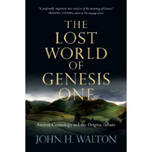The Lost World of Genesis One: Ancient Cosmology and the Origins Debate by John H. Walton
Why I read it? I was looking for a strong non-concordist (meaning, not everything in Genesis 1 was written to be a metaphysical blow by blow account) defense after reading some works from a different viewpoint by Edgar Andrews in Who Made God and Christ and the Cosmos . Many of the defenses of the non-concordist position claim the Genesis account is poetic but don’t go on to give why the account is recorded with the structure of days.
Why should you read it? If you have struggled with wanting to take the Bible account in Genesis 1 seriously yet not discount scientific findings, this book offers a way through.
Cliff notes for the lazy or uninclined. Walton argues that we read Genesis 1 wrong when we read it as a metaphysical blow-by-blow account of how God created. It is this “how God created” reading that sets Genesis 1 in opposition to current scientific creation models. Walton argues that reading Genesis 1 this way is not to read it like a Hebrew. A Hebrew would have been concerned not with the how to of creation but with its function. What purpose did the things God made serve? What was the light for? What was the land for? Walton uses parallel text from other Ancient Near East cultures to show the question of function and purpose was their prime concern. He contends that Genesis 1 reveals God setting up a cosmic temple in which He would dwell with man.
What remains to be seen. Walton’s book is a new argument for non-concordists. I am not aware of any work that takes this strong of a position as to the why of Genesis 1. Walton’s vast knowledge of Ancient Near East culture and parallel texts is undisputed. The functional view is so new that it is yet to be be debated or refuted. I am looking for to the dialogue it will create. If the argument holds, it offers a clear way through for those taking the text and science seriously. Frances Collins, the genome mapper says, “Walton elevates Scripture to a new level of respectful understanding, and eliminates any conflict between scientific and scriptural descriptions of origins.” To date, it is the closest published position to my thoughts on Genesis 1 that I have found.
